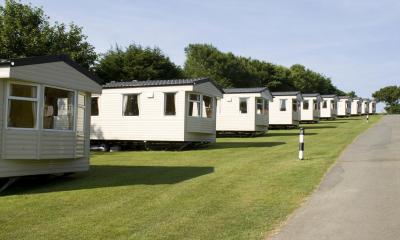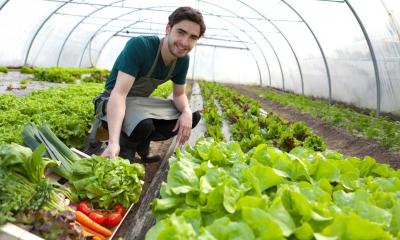
Caravan sites located in popular areas have benefited from more people taking some or all of their holidays in the UK rather than going abroad. This trend has been amplified since the coronavirus pandemic when Britons were prevented from travelling abroad. Many discovered the attraction of holidaying in the UK for the first time and are deciding to book vacations at home rather than traditional overseas holiday locations.
Check out our practical guide for starting and running your own caravan site.
- Is there demand for caravan holidays in your proposed location?
- Who will stay at your caravan site?
- Decide what services your caravan park will offer
- What facilities will your caravan site offer?
- Your tariff
- Caravan site licensing
- Caravan site occupancy
- Star rating scheme
- Buy an existing caravan site
Is there demand for caravan holidays in your proposed location?
If you are planning to develop a new caravan site you will need to establish whether there will be enough demand to make the venture a success. And if you have decided to buy an existing site you need to be confident that present levels of demand will continue, or can be improved upon.
First of all, decide on the sector(s) of the market you want to target. These might be:
- The static holiday caravan sector. If your site is in a scenic area, close to beaches, lakes or other tourist attractions it is likely that many people will be interested in owning a static holiday caravan which they use as a second home.
- The touring caravan sector. Caravanning and camping are popular activities and, weather and competition depending, a site in a tourist area is likely to attract a good level of seasonal visitors.
- The residential mobile home sector. For example, your proposed location may contain many elderly people keen to sell their bricks and mortar houses and to move into smaller, cheaper and lower maintenance properties.
Once you have decided on the type of caravan site to operate you will need to consider:
- how much competition there is already, and whether it will affect demand for your site
- why people will choose your site rather than your competitors'
A quick search online will give you an idea of how many existing caravan, camp sites or residential home parks there are and the amenities and facilities they offer. You could also look at local print directories. Check their websites, any brochures or leaflets they produce and try to visit each site to see how well-maintained they are, what they charge and what sort of resident or visitor they are attracting.
Also consider any other types of self-catering accommodation that might be available such as holiday chalets, houses or apartments. Your local tourist information office may be able to give you some indication of the number of visitors each year to your area and what type of accommodation they choose.
If you are taking over an existing holiday site, you can check pre-existing advance bookings for the coming season. The previous owner may be able to give you an accurate picture of occupancy levels throughout the year based on previous years. You can then decide if you want to try to improve on this by, for example, providing better wet-weather facilities or targeting a different type of visitor.
Research current trends, plus legal and tax issues
Who will stay at your caravan site?
The types of customers that your business attracts will depend to a certain extent on the type of caravan site you are planning to run.
Static holiday caravans
Many static holiday caravans are privately owned by people who want a reasonably priced second home in the countryside, close to the beach or near tourist attractions or sites of interest. Many of these owners will be older couples but they are likely to permit the caravan to be used by family and friends. Some sites discourage private owners from renting out their caravans because they do not have any control over who will be renting them. Holiday sites are very popular with families so it is important that the family atmosphere is maintained.
Touring caravans
Touring caravan holidays and short breaks are very popular with young families and also with older couples. You will have to decide on the type of visitor you would like to attract - for example, some sites provide a range of facilities to appeal to children of all ages, while other sites highlight the fact that they cater exclusively for mature adults so that a calm peaceful atmosphere is provided. If you're near a ferry port or the Channel Tunnel, you may also have customers wanting to break their journey on their way to mainland Europe or Ireland.
Residential park homes
Residents in permanent park homes are generally older people, either couples or individuals. Indeed, you might specify that no one under, say, 55 years of age can buy a park home on your site. If no specific age restriction is imposed on park home owners the site agreement may state that no young children are permitted.
Special offers and discounts
Most sites operate a variable tariff so that pitch fees are highest during periods of peak demand such as the summer holidays and lowest during the least popular months. In addition you might consider offering other discounts such as:
- for a two week stay (this might be a discounted second week or an incentive such as free electric hook-up)
- special rates for the over-50s
- group and rally rates
Disabled access
Don't forget that the site and facilities should be accessible to disabled visitors. You can download a copy of the National Accessible Scheme (a nationally recognised rating scheme for accessible accommodation) for holiday, touring and camping parks from the Visit Britain website.
Decide what services your caravan park will offer
As well as offering holiday or residential accommodation and a range of site facilities, there are a number of services that you might provide, such as:
- Handling holiday bookings on behalf of static holiday caravan owners. You are likely to keep a share of the rental charges (for example 10%) in commission.
- Offering credit facilities to people buying a new caravan. The credit company generally pays you commission for arranging this. Bear in mind that you're likely to need consumer credit authorisation from the Financial Conduct Authority (FCA).
- Arranging insurance cover for privately owned caravans on site, for which the insurance company will normally pay you a commission. Arranging insurance is regulated by the FCA and you will need to be either directly authorised by the FCA or become an appointed representative of an FCA authorised insurer.
- Providing a tow-on/off site service, usually for a small fee.
- Summer or winter caravan storage. This may be in the open or under cover and storage fees are usually payable in advance.
- New caravan sales. Some sites insist that caravans are maintained in a clean and tidy condition and that they are not more than, say, 20 years old. It's likely that you'll also charge a 'siting fee'.
- Commission on private sales of second-hand holiday caravans. Most sites allow caravan owners to sell their caravans in three ways - back to the site; to a new incoming buyer (where the caravan remains on the pitch and the remainder of the pitch rental period is transferred); and to an off-site buyer where the caravan is removed. Where the caravan sold remains on the pitch, it's usual for the site to charge a commission on the sale. Unlike with residential park homes (where the maximum commission is 10%), there's no legal maximum commission for holiday caravans, although if you're a member of the National Caravan Council you can only charge a maximum commission of 15% (plus VAT). Where the caravan is sold off the site, it's usual to charge a removal fee.
What facilities will your caravan site offer?
Although some holidaymakers actively seek out 'cheap and cheerful' sites with very few amenities, many more expect high standards. To attract a steady stream of visitors to your site, it is vital that the site itself is smart, well laid out and maintained. It can also be a good idea to offer a range of facilities such as:
- electric hook-up points for tourers and motorhomes
- comfortable (and heated) toilet and washing facilities, including hair driers
- laundry block, including washing and drying machines and irons
- hard standing
- children's play area
- dog walking or exercise area
- sales of gas
- shop and vending machines
- fast food outlet (such as a fish and chips or a burger bar). Some site owners arrange for mobile vendors to visit the site on a regular basis, others operate an outlet themselves
- waste disposal points
- clubhouse with bar or restaurant
- swimming pool
- games room
- bike hire
- mini golf
Because UK summers are so unpredictable it would be wise to also give some thought to any wet weather facilities you could provide.
Advertising your caravan site
Whatever the range of facilities that you decide to offer it is very important that people get to know about you. Although word-of-mouth recommendations are very valuable you should also take active steps to attract visitors to your site.
There are a number of things you can do to promote your caravan site:
- Create your own website. This can help you to attract both domestic and overseas visitors. You might consider including an online booking facility and/or live availability calendar.
- Set up a Google Business Profile so that you appear in searches for caravan sites in your area.
- Create an attractive brochure. Print and distribute this as widely as possible and create a version can that be browsed on your website.
- Advertise in a local holiday or tourist information guides.
- participate in a national star rating scheme, operated by the national tourist organisations. Star rated sites are listed in a free directory produced by the National Caravan Council
- Enter into an association with the Caravan Club as a managed under contract site and benefit from a listing on the Caravan Club website.
- Make sure your site presents a smart frontage to the road and is well signed.
Your tariff
The fees you will charge will depend on the nature of the site you are proposing to operate.
Static holiday caravans
Most static holiday caravans are privately owned and you will charge owners an annual ground rent, usually payable annually in advance. You will also charge for site preparation and mains connection when a new caravan is installed on site. As with residential park homes, you're likely to generate income from sales of new holiday caravans either by buying them directly from the manufacturer and adding your mark-up or by acting as an agent for a local dealer in return for a commission.
When a holiday caravan owner decides to sell their caravan to a new buyer and the caravan remains on the pitch, you'll usually charge a commission on the sale of around 15%. If they sell their caravan off-site so it's removed from the pitch, you'll probably charge a removal fee. Holiday caravan owners may either pay you a flat rate for electricity and water or they may have a meter installed and pay the utility company themselves.
Site owned static caravan holiday rentals
You might decide to have some static holiday caravans of your own that you rent out to visitors. Weekly charges vary, depending on whether the booking is for a period in the low season (spring and autumn months) or the high season (summer months and school half terms). The charge can also be affected by how old the caravan is, how well it is equipped and its position on the site. You may decide to charge extra for linen hire, cot hire, extra cars and pets. Electricity costs may be included in the charge or you may have a meter installed.
Touring caravans, motor homes and tents
There are many different ways of charging campers and caravanners and you will have to decide which is the best way for you to structure your tariff. Pitch fees are usually quoted per night and they vary depending on the time of year. For example, you might split the season up into four periods; spring, early summer, mid summer and autumn.
Many sites make an all-in charge, for example the nightly pitch fee includes the caravan or motor home, car, two people, mains electricity and hot water in the shower block. Extra charges may be made for:
- awnings, tents and gazebos
- children over a certain age
- pets
- extra cars, boats or trailers
Deposits
It is normal to ask for a deposit of, say, 25% on both static caravan holiday rentals and touring bookings. Generally, these are non-refundable.
Although you will have to set your tariffs by reference to your own costs you may need to make sure that your pitch fees are broadly in line with your competitors.
Residential park homes
Park homes themselves are normally owned by the resident but you will own the land on which they are sited. Usually a new resident will pay you (the site operator) for a new or second-hand unit. When you order a new unit, the manufacturer will allow you a discount off the list price of, say, 25%. The price you quote to the new resident is for the provision of the unit (including a siting fee), the preparation of the concrete pitch base and the connection to mains services. It's important to make sure that the difference between what you pay out and what you charge the new resident is enough to cover all of your costs.
You will also charge your residents an annual pitch fee. (This is likely to be slightly more for a twin unit than for a double one.) When a resident decides to sell their park home and leave the site you will be entitled to a commission of up to 10% of the sale price. There is detailed guidance on the process of selling a park home on the GOV.UK website.
You need to make sure that income from new residents, annual pitch fees and sales commission is enough to cover all of your operating costs as well as your own drawings.
Caravan site licensing
Almost all caravan sites, whether residential home park, static holiday or touring caravan, must have a licence from the local authority. The licence will only be granted if the site complies with certain minimum standards. Model standards for residential, static holiday and touring sites have been produced and are available from your local authority.
The caravan site licence conditions cover a range of matters such as:
- density, that is the number of caravans that can be accommodated at the site. More touring units than residential units per hectare are permitted
- space between each static caravan
- roads, gateways, footpaths and lighting
- hard standings (primarily for residential and static holiday units)
- water supply, drainage, sanitation and washing facilities
- storage space, parking
- electrical and gas installations and equipment
- fire precautions
- recreation space
The licence and licence conditions must, by law, be displayed where residents or holiday makers can see them.
Planning permission will almost certainly be required as well.
Tent camping and mixed sites
Tent camping sites also require a licence and planning permission, although there are a couple of exemptions that usually apply if you're only planning to operate for a limited number of days each year. These are:
- if you offer tent camping for no more than 42 days in a row or less than 60 in a year you don't need a site licence or planning permission
- you're a member of a organisation (such as the scouts) and have an exemption
- your site is a member of an organisation with an exemption
- members of an exempted organisation stay in their tents on your site
If you're intending to operate a mixed site that will cater for both caravans and tents, for the purposes of your site licence the local authority will usually treat the tents as touring units.
Caravan site occupancy
Although some touring caravan sites are able to open all year round most are only licensed for a shorter period, typically the start of April to the end of October. Within that period it will generally only be really busy during the peak summer holiday season and possibly over the Easter holidays and Bank Holiday weekends, particularly if the weather is good. So, while between 80% and 100% of your pitches may be occupied at some points in August, particularly if the weather is fine, this this may fall to 10%-20% of your pitches in April and October. The average for the seven-month period might work out at between 30% and 40%. The location of some sites may mean that they can achieve higher occupancy during the off-peak months. For example, they may be close to a popular tourist attraction or be particularly well-located for sports enthusiasts like surfers or walkers. This may mean that they choose to remain open year-round, as long as the terms of their licence allow it.
(Figures used for illustrative purposes only - your own occupancy figures may vary quite substantially and will depend on local market conditions, the weather, the level of competition and so on.)
To calculate the pitch occupancy percentage each month divide the number of pitches actually occupied during the month by the total number available and multiply this by 100. Your local tourist board may be able to give you details of average caravan park occupancy levels in your area. These will help you to benchmark the performance of your own site.
You may find it useful to read the average occupancy statistics for caravan and camping sites in Scotland and Wales that are published on the VisitScotland and Welsh Government websites. (Occupancy figures for non-serviced accommodation in England aren't collected but the 'Tourism Business Monitor' published five times a year by Visit Britain does include a great deal of helpful information about booking levels and expected future performance of caravan and camping sites. This publication is available on the Visit Britain website. The Tourism Northern Ireland 'Tourism Industry Barometer' - available to download from the Tourism Northern Ireland website - performs a similar role.)
Star rating scheme
Consumers generally expect very high standards from providers of services and many holidaymakers want to know that certain minimum levels of facility will be in place at the caravan site they propose to visit.
The National Tourist Boards for England, Scotland, Wales and Northern Ireland, together with the National Caravan Council and the British Holiday and Home Parks Association (BH&HPA), operate the British Graded Holiday Parks Scheme. This grades sites according to the quality of the facilities and services provided, cleanliness and atmosphere.
Any caravan park can participate in the scheme. An independent assessor will visit the site and then award a star rating from one to five, as follows:
- One star. The services and facilities are provided to a Acceptable to Good standard
- Two stars. The standard is Good throughout
- Three stars. These parks provide a Very Good level of services and facilities. This level is regarded as the industry standard
- Four stars. Excellent facilities are provided by caravan parks awarded four stars
- Five stars. In addition to providing an Exceptional standard throughout, these sites also offer additional facilities such as the daily availability of basic groceries
Gaining a star rating can be a useful marketing tool, assuring potential customers that the site is operated to certain standards. Visit the UK Parks website for further information.
Buy an existing caravan site
You might decide to buy an existing caravan site rather than start your own venture from scratch. Buying a going concern can mean that caravans, customers, staff, premises and equipment are already in place. Also that:
- the site (possibly including static holiday or residential caravans) has already been developed and facilities such as hook-ups are already in place
- planning consent and a site licence have been obtained
- depending on the nature of the site, there may be established residents, static holiday caravan owners and loyal repeat customers
- a business website has already been set up and relationships with booking agents have already been established
Other matters to consider include:
- the state of the site as a whole, including the premises, boundaries and infrastructure. Will you have to spend money refurbishing or replacing assets
- the condition, age and value of any site-owned caravans included in the sale. Check this over carefully before agreeing a price
- occupancy levels of the site and visitor numbers to your area for the past few years. These should give you a good idea of how popular your local area is and how well the site has been doing
But buying a business can be a hazardous, expensive process unless you have the right skills and experience on your team, including legal and financial know-how. Establish the genuine trading and financial position, so that the price you pay for the business is not too high.


